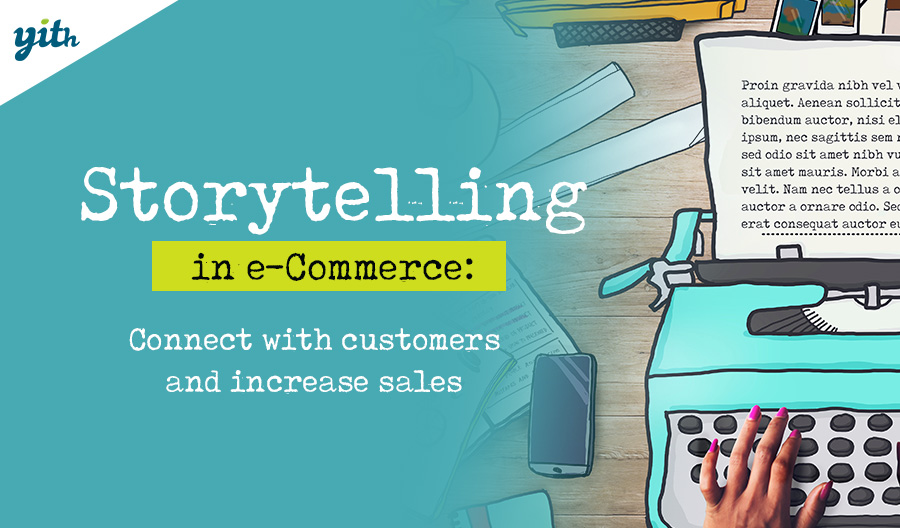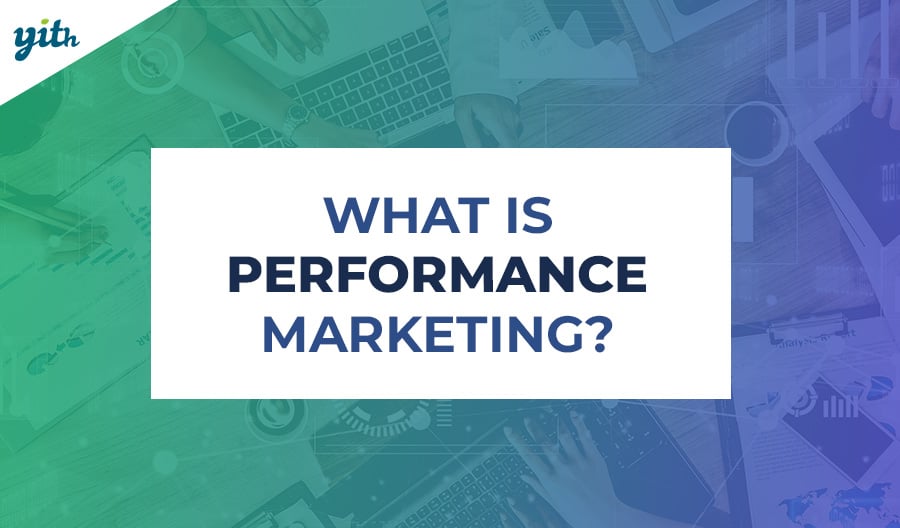If you want to succeed in the world of eCommerce, it is crucial to understand that not all online business models are created equally. In fact, there are significant differences between each business reality that can greatly impact their success.
When we think about online sales, we usually think of big names like Amazon, eBay, and AliExpress. But it’s important to remember that these companies only represent one aspect of the world of online sales.
When discussing portals, it’s important to distinguish between those operating under a B2C (business-to-consumer) sales model and the often-overlooked B2B (business-to-business) portals.
But what should you pay attention to if you have such a site? And what plugins can help you get the most out of your business?
Keep reading to find out the answers to these burning questions.
Table of contents
What does B2B mean
In the business world, B2B stands for Business2Business or business-to-business. It’s all about products and services that are meant for businesses to buy, not for individual consumers.
So, we might notice that even though products can be similar, they may have different audiences. As we go on, we’ll see that B2B and B2C have pretty obvious distinctions.
If you’re running a B2B store, it’s essential to consider this significant distinction as it will affect several aspects.
How B2B differs from B2C (business-to-consumer)
So, you may be wondering what the differences are between B2B and B2C and how they impact your website. Well, there are quite a few differences, but let’s tackle the most obvious ones.
Wholesale and warehouse cost
In the world of business, the price of your goods or services is the first thing that gets impacted by this contrast. Since the end customer is not involved, and a company acts as a middleman, the prices are usually lower than the retail prices. This is done to encourage companies to place bulk orders.
If we compare AliExpress and Alibaba, the distinction between the two becomes quite apparent. While both platforms offer affordable products, a quick glance through their listings reveals a significant price difference. This can be attributed to the unique features of each platform.
So, here’s the deal: AliExpress is mainly for individual buyers (though some small retailers use it too), while Alibaba is more for business-to-business transactions. The thing is, you might find the same product on both sites, but it could be way cheaper on Alibaba… if you’re willing to place a big order.
It’s pretty common to come across products being sold in batches of hundreds or even thousands, which gives a clear indication of the website’s target audience.
SEO and indexing side
If you’re in the online sales game, you’re likely aware that SEO is key to nailing your eCommerce game. Your portal’s content needs to be optimized for your products and your customers to see the best results.
So, if you’re offering B2B products or services, it’s crucial to keep this aspect in mind. Let’s consider hosting services as an example, where two products may be alike but cater to distinct audiences.
There’s a variety of services available, but not all of them cater to the same crowd. You’ll find budget-friendly options that are suited for beginners and small businesses, as well as premium solutions that are better suited for bigger companies. And then there are B2B solutions that are specifically designed for resale through professionals and web agencies.
If you’re targeting regular customers, you can provide them with articles and products that cater to their most common concerns like the expenses involved in hosting and domain switching. However, if your audience comprises professionals, you’ll have to shift your focus to other areas such as technical support, discounts on high-volume websites, customization, subcontracting support options, and so on.
In short: remember to consider the needs and preferences of other businesses when communicating with them.
Sales method
In the world of B2C sales, the process is pretty standard. A product is listed for sale online, a shopper discovers it, adds it to their cart, and buys it. Although there may be some exceptions — like auctions or private negotiations — this is the typical way things go down.
When it comes to running a B2B store, things can get a bit tricky. These orders usually involve big quantities of expensive products and require the approval of multiple decision-makers. So, it’s not as easy as just clicking a buy button.
So, to get as close as possible to this kind of interaction (don’t worry, we’ll talk about a plugin that can help!), usually the customer and seller need to chat a bit to work out the details before making the sale.
As a result, certain stores in this category provide searchable product catalogs but don’t allow direct purchases. Instead, they respond to requests for quotations to engage with their customers.
In the realm of B2B sales, the sales cycle tends to be considerably lengthier and more intricate than in B2C sales, unless there’s an option to automate certain aspects of the process.
In this article, we’ll explore the process of creating a similar experience on WooCommerce.
Customer value
When it comes to distinguishing between B2C and B2B, it’s important to consider the future value of each customer. This extends beyond the higher value that often comes with larger order sizes. In fact, in B2B relationships, the focus is often on establishing a long-term partnership that can promote stability for your business.
Maintaining customer loyalty is a challenging task, especially in B2C settings where marketing strategies revolve around this aspect. However, in a B2B scenario, building a lasting relationship with your clients is relatively easier. This makes it crucial for businesses to focus on establishing ongoing relationships with their customers to ensure their loyalty and satisfaction.
So, it’s important to keep this in mind while engaging with your customers and getting your store ready.
Customization
One of the reasons why people ask for quotes is because they want products or services that are tailored to their business needs. Even B2C products sometimes need customization, but for B2B it’s almost always a must to let customers customize their orders.
Sometimes, in cases where there’s usually a need for direct communication and information exchange between the seller and customer, this step can be skipped by providing direct personalization options on the product page.
Later on, we’ll dive deeper into how to make this happen.
Similarly, this also applies to customer service and personalized support for every user.
Even in B2C sales, this aspect holds significant importance. However, it’s not always easy for customers to reach out to their sellers, they usually do it only when they face issues with their orders.
In a B2B scenario, this happens on a regular basis, and you will need to invest not only in the correct staff to meet this need but also in tools that allow for proper and fast communication.
Why B2B plugins are essential for eCommerce
WooCommerce is an amazing tool that can transform your website (even if it’s just a blog) into a top-notch sales machine with just a few clicks. It’s super easy to use and highly versatile.
One of the major strengths of this tool is its remarkable flexibility which allows it to adapt to all kinds of markets.
It’s worth noting that WooCommerce wasn’t initially designed for B2B purposes and lacks some features required for this business model. Fortunately, there are specific plugins available that can seamlessly integrate with the platform and provide all the necessary functions.
Top 10 WooCommerce plugins for B2B stores
As B2B stores vary from one another, we have created a list of the top ten plugins that can prove to be highly beneficial for your business. Our comprehensive guide includes brief descriptions, screenshots, and detailed explanations of how each of these plugins can improve your B2B store.
This way you can choose which ones best suit your strategy and see how to use them to optimize your store’s potential.
1) WooCommerce Catalog Mode
The first plugin we want to mention is widely popular in the B2B industry. YITH WooCommerce Catalog Mode offers an exceptional solution to transform your WooCommerce online store into a virtual storefront. This allows prospective customers to browse through your products and access all the necessary information, without the option to buy directly.

If you’re looking to get in touch with your customers before making a sale, especially in B2B industries where personalized orders are a must, this plugin is the perfect choice. It’s ideal for establishing a connection with your customers and ensuring that their needs are met.
So here’s what your store would look like to customers:

Naturally, you gotta keep the contact form as simple as possible. That’s why this plugin is usually paired up with the next one.
2) WooCommerce Request a Quote
Considering the characteristics of the previous plugin, it was easy to anticipate the functionality of another plugin in this selection. YITH WooCommerce Request a Quote offers a unique selling experience by substituting the standard “Add to cart” button with an “Add to quote request” button, enabling customers to request a personalized quote.
With this plugin, your customers can effortlessly add one or multiple items to a quotation request. Then they can simply input their personal information and send it directly to you.

As soon as they hit the button to request a quote, you’ll have the chance to check it out, make changes, give it the thumbs up or reject it altogether. If you send the quote, your customer will get a notification to take a look at the final version. If they’re happy with it, they can proceed to place the order and pay.
What’s more, you’ve got the power to whip up personalized quotes for clients who reach out to you outside the platform. This way, you can make it easier for them and move the order to the site.
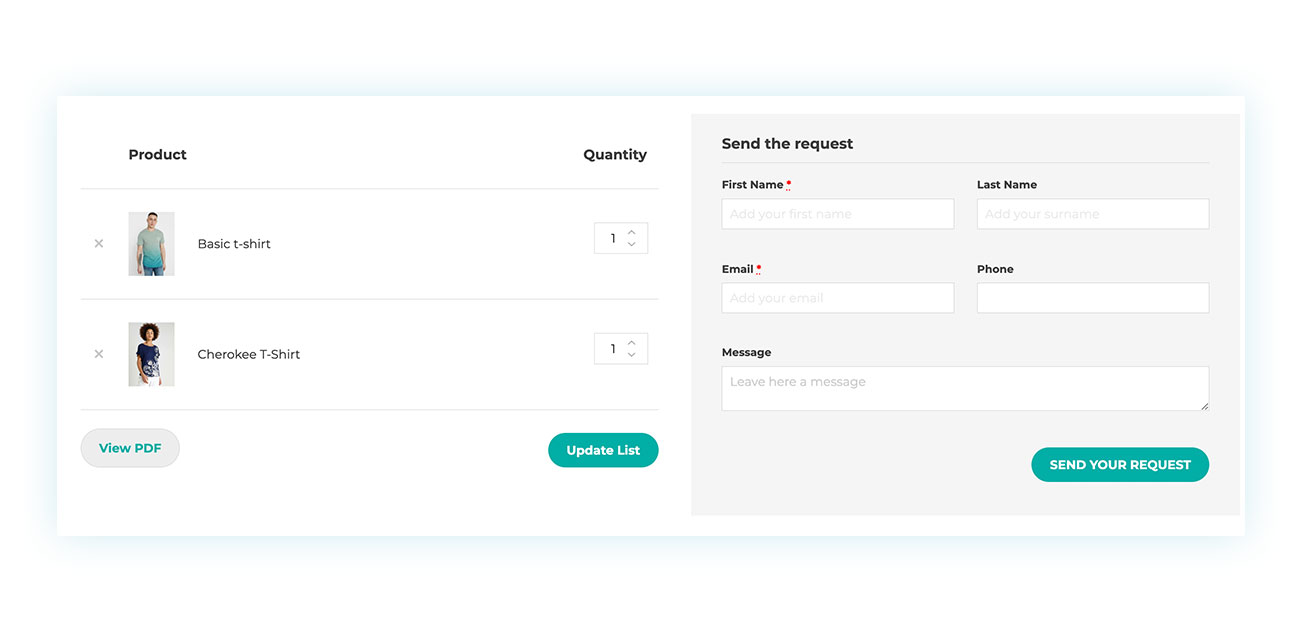
In simple words, this plugin is a great addition to Catalog Mode. And guess what? All the plugins in this list play well with each other. So, you can’t go wrong with any of them.
3) WooCommerce Role Based Prices
If you’re looking to offer different prices based on the user role, YITH WooCommerce Role Based Prices is the way to go. It’s perfect for giving different prices to different businesses and showing different prices for B2B or B2C formulas. Trust us, it’s a game-changer.
The plugin’s standout feature is the ability to display different prices to users based on their assigned roles but it also offers customization options that include the buy button. And it works seamlessly with Members, the free WordPress extension, to facilitate the creation of new roles.
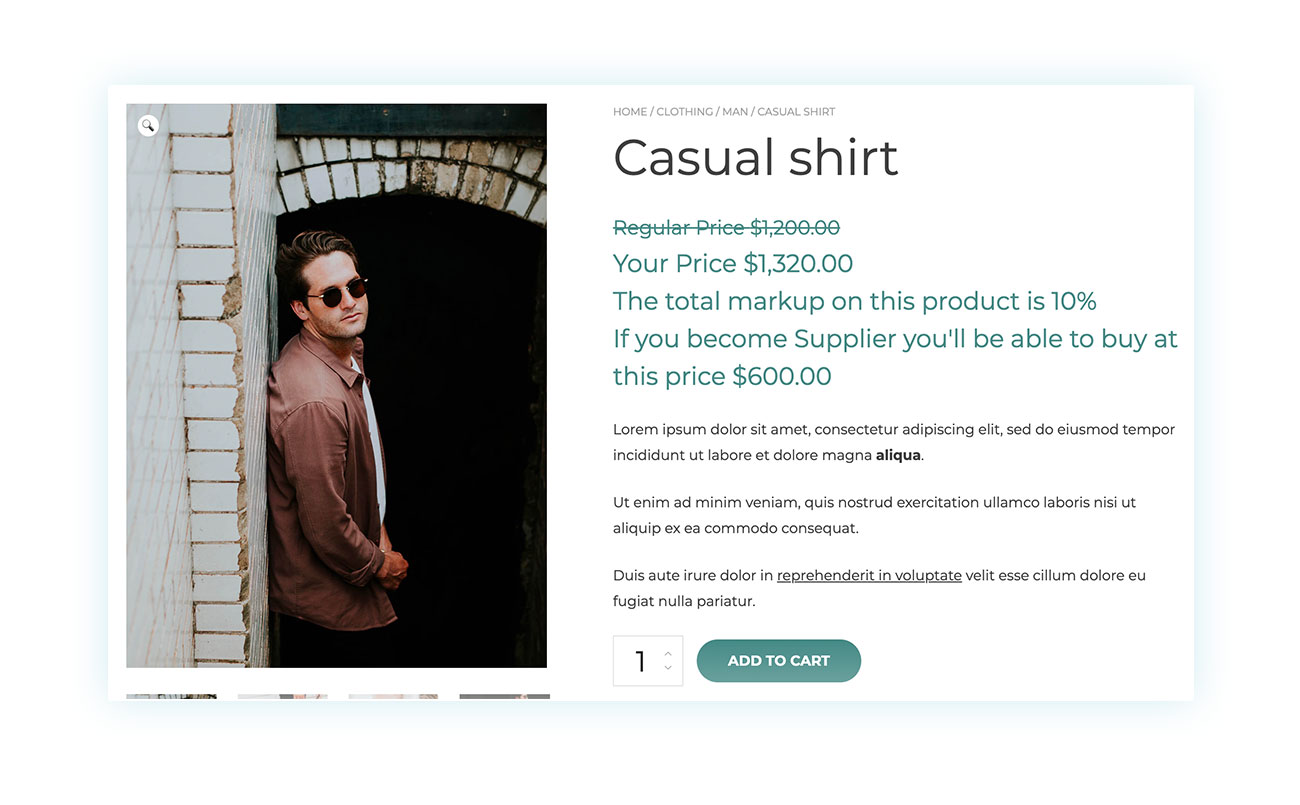
A plugin with this functionality has a thousand uses, based on the sales strategy you want to apply on your store.
4) WooCommerce Dynamic Pricing & Discounts
Even though B2B sales may be different from B2C sales, they both have one thing in common: everybody loves a good deal. And let’s face it, discounts and promotions are still an effective marketing and sales tactic in any scenario.
That’s why we recommend checking out the YITH WooCommerce Dynamic Pricing & Discounts plugin. It’s a great tool to customize your store’s discounts and create advanced discount strategies.
In simpler terms, with it, you can set up a discount system for a B2B store which will lower the product cost depending on the quantity purchased. This would allow your store to switch easily between B2C and B2B.

5) WooCommerce EU VAT & OSS
If you’re running a store that caters to both B2B and B2C customers in the EU, you might want to check out YITH WooCommerce EU VAT & OSS. It’s a super useful tool that lets you easily manage sales within the European Union so you can charge the right VAT based on the country where your customers are located or exempt it entirely for your B2B clients. Give it a try!
Moreover, this plugin allows you to activate and handle the OSS procedure, which is compulsory from 2021 onwards.

A simple plugin, but essential for your store.
6) WooCommerce Barcodes and QR Codes
If you’re looking for a handy tool for big warehouses, we recommend checking out the YITH WooCommerce Barcodes and QR Codes plugin. It’s a great solution that lets you create and assign barcodes and QR codes to your store’s products.
As a pro, you can get this done with a single click for all products in no time. No need to spend precious minutes on every single item.
The plugin is fantastic for physical stores too. You can even configure it to automatically update the stock on your website when a barcode is scanned. Pretty neat, huh?
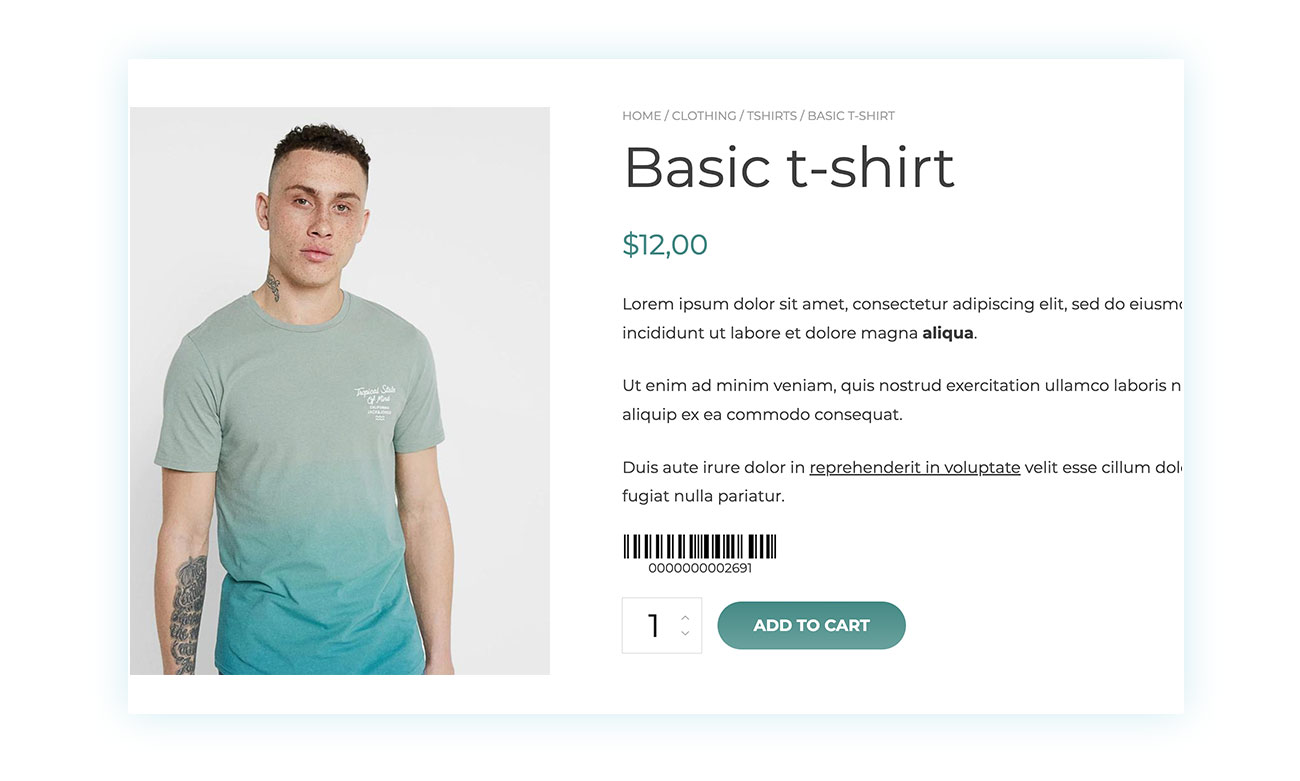
7) WooCommerce Subscription
A significant difference between B2C and B2B sales is that businesses tend to need products or services on a recurring basis. The reason for this is that they are using them within their respective business.
If you want to ensure a steady stream of sales in the future, you should consider offering recurring payments. This approach allows you to charge customers a consistent amount at regular intervals, eliminating the need for them to place a new order each time. By doing so, you can maintain a reliable revenue stream while providing a hassle-free experience for your customers.
To achieve this, you can use YITH WooCommerce Subscription. This plugin functions seamlessly allowing you to set the recurring cost on the product page, just as you would typically do on WooCommerce.

With this one tool, you can simplify things for your fellow businesses, lock in loyal customers, and enjoy a steady income.
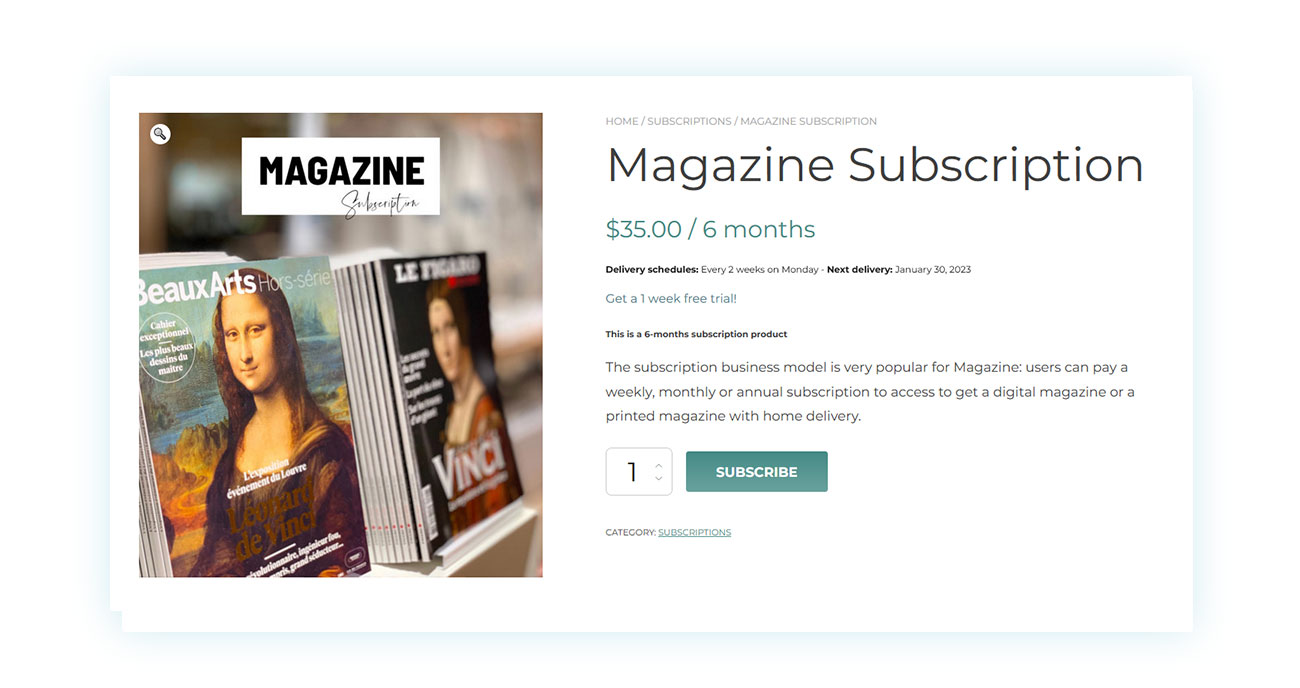
8) WooCommerce Minimum Maximum Quantity
When it comes to B2B products, one handy tool to consider is the YITH WooCommerce Minimum Maximum Quantity plugin. It lets you specify the minimum and maximum number of items that a customer can buy.
As a wholesale store, it’s important to be strategic with your pricing. Offering a reduced price on a single product may not be worth the risk, as end customers may only purchase that one item.

You can define different kinds of limits, like how many products can be added, how big the cart can be, and the minimum and maximum amount customers can spend.
Out of all the plugins out there, this one is a must-have for a B2B portal to work smoothly.
9) WooCommerce Bulk Product Editing
Are you tired of spending hours editing each product in your store one by one? It’s time to simplify your life with YITH WooCommerce Bulk Product Editing! With this plugin, you can edit thousands of products at once, saving you time and effort. Say goodbye to the hassle of editing each product individually.
To make life easier, you can save the product views for future reference. This will not only save you a lot of time but also cut down costs associated with your employees.

10) WooCommerce Product Add-Ons & Extra Options
As we brought up previously, B2B products usually require some level of customization. Typically, this involves exchanging emails and quotes. But it might be worth exploring the possibility of streamlining this process through automation.
With the YITH WooCommerce Product Add-Ons & Extra Options plugin, you can add extra options to your products, giving your customers more choice and control over their purchases.
As a bonus, you assign a price to any extra options you offer. Basically, this plugin covers all grounds as far as customization is concerned. You can start with a basic product and then gradually incorporate all the tweaks your customers request in private. This way, you’ll save time on back-and-forth communication and shorten the buying process.
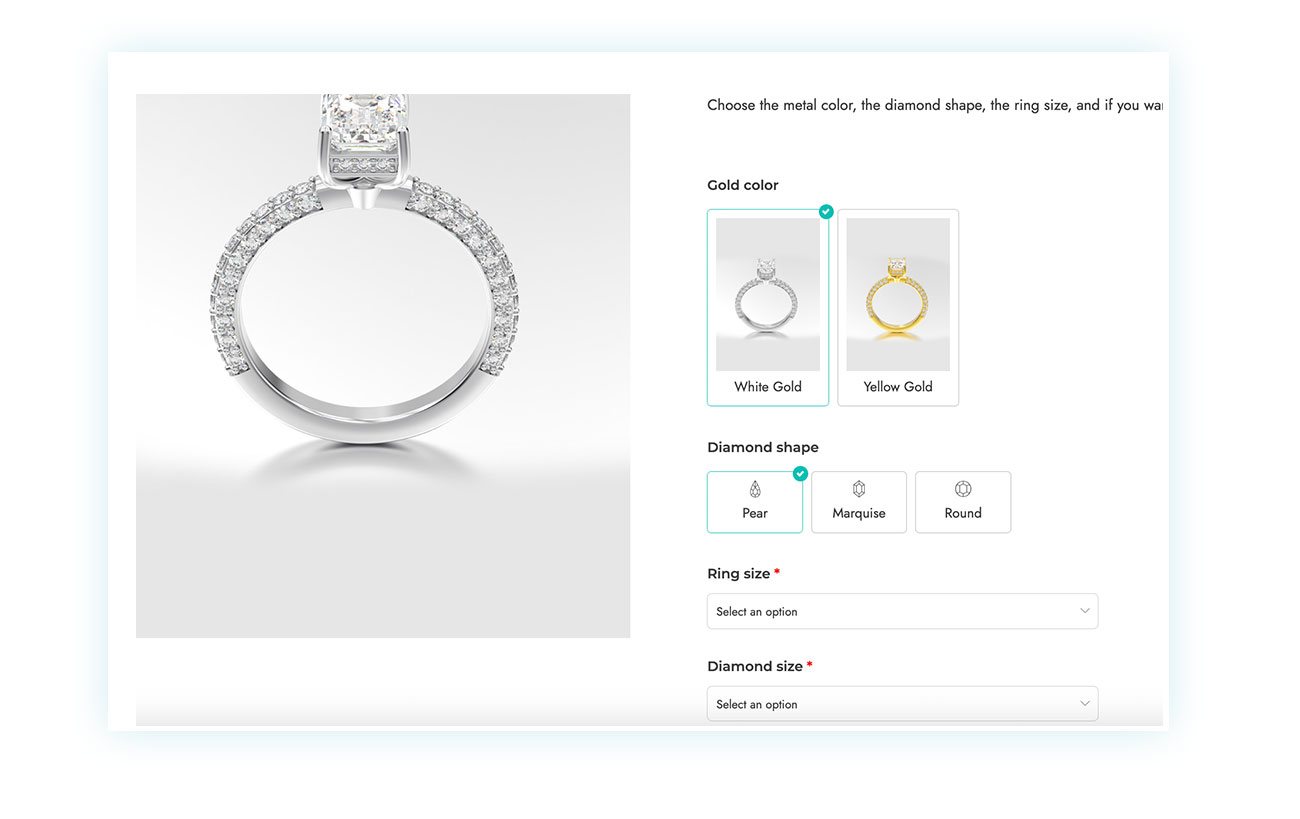
FAQ
- What is a B2B plugin for WooCommerce?1. In the world of eCommerce, there are certain plugins that are designed specifically to enhance the B2B market model. It is important to note that B2B differs significantly from B2C, and therefore requires specialized functions in order to optimize your digital storefront.
- Why should I use a B2B plugin for my WooCommerce store?1. If you’re looking to set up an eCommerce platform, WooCommerce is the way to go. It’s super easy to use and you can customize it to your heart’s content. Instead of spending a ton of money on creating an advanced platform from scratch, you can start with a simple, free base like WooCommerce and add in any missing features you need. Trust me, it’s the smart choice.
- How can a B2B plugin improve my WooCommerce store?1. B2B plugins are a game-changer! They offer a ton of features that can transform your store into a storefront, like adding a quote button, changing the price based on the number of items selected, and setting minimum and maximum purchase limits. Basically, they have everything that a B2B store needs.
- What are the best B2B plugins for WooCommerce?1. There are several plugins out there, but the crucial ones are WooCommerce Catalog Mode, WooCommerce Request a Quote, WooCommerce Dynamic Pricing & Discounts, and WooCommerce Minimum Maximum Quantity.
- Can I use multiple B2B plugins simultaneously on my WooCommerce site?1. Our recommendation is to use plugins that are seamlessly integrated with each other. For instance, YITH plugins are created by the same team and are fully compatible with each other. Additionally, some of these plugins offer integrations that can provide access to new functionalities.
- What is the difference between a B2B plugin and a B2C plugin for WooCommerce?1. B2C plugins are incorporated to introduce features that are tailored for retail purposes. Although there are instances where they can also be beneficial for a B2B store and vice versa, certain functions are exclusive to each business type.
- Can I try a B2B plugin before buying it?1. Some plugins have a free version with limited features. We suggest you verify if the plugin you are considering has a free version available to try it out.
- How much does a WooCommerce B2B plugin cost?1. The pricing of each plugin varies and it is typically offered as an annual subscription. Once the subscription period ends, the plugin will still function effectively, but there may be certain limitations in terms of updates and support.
- Are B2B WooCommerce plugins compatible with all WordPress themes?1. In general, compatibility is high, but we recommend using themes developed for WooCommerce to minimize the potential for any issues.
- What kind of functionality should I expect from a good B2B WooCommerce plugin?1. For your B2B sales, it’s recommended to opt for plugins that can help in wholesaling, such as those that offer customized products or reduce prices based on the quantity of products purchased. Additionally, plugins that assist with inventory management can be extremely beneficial since B2B sales usually involve handling high volumes of business.
- Can I use a B2B plugin if my WooCommerce shop sells to both B2B and B2C customers?1. Indeed, there are several plugins available that allow you to implement diverse features based on customer preferences. Certain plugins are especially useful in building a versatile online store with multiple functionalities.
- Do B2B WooCommerce plugins support multiple currencies and languages?1. Each plugin is different, but generally, WooCommerce plugins are highly flexible.
- Is there a B2B plugin for WooCommerce that offers an electronic invoicing functionality?1. Yes, we recommend the WooCommerce PDF Invoices & Packing Slips plugin.
Conclusions
As you can see, a B2B store can excel on WooCommerce with the right plugins that seamlessly integrate all the necessary features required for your business.
In today’s fast-paced digital era, it’s crucial not to fall behind the competition. Take your B2B business online and witness the profits increase!


